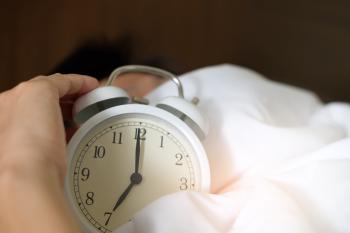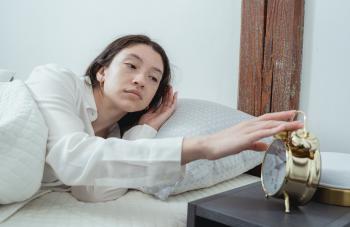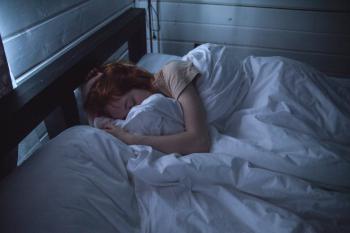Understanding and Managing Your Alarm Anxiety
- Alarm anxiety is the fear of the alarm not waking you up in the morning
- Alarm anxiety also has to do with not getting enough sleep before it goes off.
- We reveal great tips for becoming a ‘good sleeper’
Waking up to the blare of an alarm is a familiar routine for many. Yet, for some, it’s more than just a start to the day—it’s a source of stress and anxiety. Alarm anxiety, a fear of clock failure, or simply the disruptive nature of an alarm sound can significantly impact our sleep quality and overall well-being. If you’ve ever felt the jolt of stress when your alarm goes off or the incessant worry of false alarms disrupting your bedtime routine, this article is for you.
Understanding Alarm Anxiety and Its Impact on Sleep

What is Alarm Anxiety?
Alarm anxiety is when someone feels really worried or stressed about their alarm clock not working properly or not getting enough sleep before their alarm is supposed to wake them up.
People may experience it as that suffocating sound of the alarm abruptly jolting you out of a peaceful slumber. Moreover, the crippling fear of not waking up on time, or OCD-driven preoccupation with setting the alarm correctly, can translate into an insomnia-like sleep disorder. Many often fear the alarm clock sound due to the anxiety symptoms it triggers.
Here’s how it often unfolds: You lie in bed, anxious about getting enough sleep. You worry about the stress of not getting enough rest due to a potential alarm failure. You continuously check the time on your smartphone, needing to set the alarm several times—essentially becoming a hostage to your alarm clock. Much of the anxiety is rooted in the fear of disruption – whether you’re traveling or staying at home, the inconsistency of different alarm tones or the unexpected sound pollution from Netflix can cause people to feel chronically unsettled.
According to Lisa, a sleep coach from Edinburgh, alarm anxiety takes a toll on both the mind and body. The stress hormones alarm anxiety triggers can severely interrupt our circadian rhythm, affecting how our brain’s amygdala processes the fight or flight response, and hence ruining our efforts at going to sleep effortlessly at night.
Strategies to Improve Sleep and Reduce Alarm Anxiety
- Refrain from looking at the clock in bed, especially on smartphones and use airplane mode or a softer alarm sound.
- Experiment with gentle, gradually escalating alarm sounds in sync with your sleep-wake cycle.
- Create calming routines to signal readiness for sleep. You can also engage in activities like reading or mindfulness for anxiety reduction. Make sure to keep your smartphone in airplane mode to avoid interruptions.
- Recognize that loud alarms can trigger anxiety and disrupt sleep and that excessive alarm checking can worsen anxiety in those with anxiety disorders. Find methods for a gradual transition from sleep to wakefulness like having lights that become brighter and brighter to mimic a sunrise.
 Yet, there’s no need for full-blown panic. Engaging safe practices can help you beat alarm anxiety. For example, avoid looking at the clock, especially on your smartphone, while lying in bed, set your phone to aeroplane mode or switch to a softer, more serene alarm clock sound. Spend more time during the daytime preparing yourself for a restful nighttime sleep travels a long way in curbing alarm anxiety.
Yet, there’s no need for full-blown panic. Engaging safe practices can help you beat alarm anxiety. For example, avoid looking at the clock, especially on your smartphone, while lying in bed, set your phone to aeroplane mode or switch to a softer, more serene alarm clock sound. Spend more time during the daytime preparing yourself for a restful nighttime sleep travels a long way in curbing alarm anxiety.
Alarm System Upgrade: Beyond Traditional Clocks
Is the sound of your alarm clock a cause for unrest? Many of us experience anxiety symptoms influenced by the abrupt nature of traditional alarms. As per sleep coach Elina Winnel and Psychology Today, trying gentle, gradually escalating alarm clock sounds can ease the transition from sleep to wakefulness. These make use of our circadian rhythm, the body’s natural sleep-wake cycle, thus reducing the shock-factor. Whether you’re a heavy sleeper or have occasional difficulties waking up, it could be worthwhile to experiment with different wake-up sounds.
Bedtime Rituals for Calm and Relaxation
Getting enough sleep can sometimes feel like a hostage situation, where insomnia keeps us wired with Netflix or TikTok as accomplices. Anxiety symptoms from the stress of not getting enough sleep can quickly spiral into a full-blown sleep disorder. This is where establishing a bedtime routine advised by experts comes in.
Whether you’re a student, a travel enthusiast, or a working master’s of your domain, winding down is essential. Create a routine that signals the mind and body for sleep. For example, lying in bed reading or practising mindfulness can reduce anxiety symptoms, preparing us for a serene journey to the land of dreams. Make sure your smartphone is set into aeroplane mode to avoid any interruptions.
Addressing False Alarms and Fear of Clock Failure
 The clamor of our alarm can often trigger a fight or flight response in our sympathetic nervous system, causing us to awaken abruptly rather than gradually. It’s crucial to recognize that this loud stimulus can turn into a source of anxiety - particularly for those with OCD or generalized anxiety who fret about the alarm’s functionality. This distress can lead to recurrent checking of the alarm through the night, culminating in a disrupted sleep cycle and potentially escalating to a complete evasion of sleep.
The clamor of our alarm can often trigger a fight or flight response in our sympathetic nervous system, causing us to awaken abruptly rather than gradually. It’s crucial to recognize that this loud stimulus can turn into a source of anxiety - particularly for those with OCD or generalized anxiety who fret about the alarm’s functionality. This distress can lead to recurrent checking of the alarm through the night, culminating in a disrupted sleep cycle and potentially escalating to a complete evasion of sleep.
Mindful techniques can be an instrumental tool in alleviating this nighttime anxiety. Consider moderating the alarm sound to a soft wake-up call as opposed to a harsh stimulus. Confirm that the alarm is set accurately, and strive to foster confidence in your preparedness. It can be a challenging practice to say no to the urge of repeatedly checking the alarm, but learning how to politely decline these obsessive habits is essential. If successfully managed, you can welcome the rest of the day with less stress and an increased sense of tranquility.
Dealing with such common life stressors is part of the profound work a life coach often guides clients through. A more peaceful morning routine, just like a greener environment, promotes healthier lifestyles and happier lives.
Jason, a software engineer who often burns the midnight oil. He began experiencing the effects of a disruptive sleep cycle after settling into a routine of late nights and early mornings, with the harsh sound of his alarm creating a regular source of abrupt wakefulness.
One evening, Jason found himself doubting whether his alarm was set correctly or would go off at all. As someone who suffers from generalized anxiety, these concerns escalated rapidly. The mounting fear turned into an obsession which resulted in Jason repeatedly waking up to check his alarm throughout the night. His sleep cycle became unhealthily irregular, leading to increased daytime sleepiness and impacting his productivity at work.
Recognizing the situation, Jason turned to mindfulness techniques. He changed the characteristic jarring beep of his alarm to a mellow and gradual release of sound, replacing the shock element with a gentler, more soothing wakeup call. More so, he made it a habit to double-check his alarm settings before bedtime and then use brief mental affirmations to reassure himself that he had set everything correctly.
With these simple adjustments, Jason noticed a drastic reduction in his nighttime anxiety. The sleep disruptions caused by his obsessive alarm checking lessened, and he started waking up feeling much more refreshed and ready to tackle the day. His experience provides a good example of how small changes in our nighttime routines and alarm systems can significantly impact sleep quality. It not only enhances good sleep hygiene but also promotes mental peace, allowing for a more energized and serene start to the day.
Techniques to Enhance Relaxation and Sleep Quality
 Throughout the day, making small adjustments can significantly impact our sleep quality. To improve your sleep quality and enjoy more rejuvenating rest, fine-tuning your daytime and pre-sleep routines can be highly effective. Creating a sleep-conducive environment—ensuring a comfortable mattress, maintaining a cool room temperature, and avoiding screen time before bed—can promote better sleep. Studies find that these efforts may indicate improved sleep hygiene, positively influencing our emotional states.
Throughout the day, making small adjustments can significantly impact our sleep quality. To improve your sleep quality and enjoy more rejuvenating rest, fine-tuning your daytime and pre-sleep routines can be highly effective. Creating a sleep-conducive environment—ensuring a comfortable mattress, maintaining a cool room temperature, and avoiding screen time before bed—can promote better sleep. Studies find that these efforts may indicate improved sleep hygiene, positively influencing our emotional states.
Being mindful of these factors not only promotes better sleep hygiene but also regulates our serotonin levels, a hormone that plays an essential role in our sleep cycle. These conscious efforts help reduce anxiety and the fear of not getting enough sleep, letting you wake up effortlessly to your alarm every a.m. with a fresh mind, ready to seize the day.
| Techniques to Enhance Sleep Quality | How it Works | Benefits |
|---|---|---|
| Use of a Comfortable Mattress | Comfortable mattresses provide better support to the body, promoting better quality sleep | Can result in less tossing and turning, reduces risk of developing muscle and joint pain |
| Maintaining a Cool Room Temperature | Cooler environment can make it easier to fall asleep and stay asleep | Promotes deep, uninterrupted sleep |
| Avoiding Screen Time Before Bed | Reduces exposure to blue light which can interfere with the body’s natural sleep-wake cycle | Helps in falling asleep faster and staying asleep |
| Mindfulness of Factors Promoting Sleep Hygiene | Conscious efforts in promoting sleep hygiene regulate serotonin levels, which plays a crucial role in the sleep cycle | Helps reduce anxiety and fear of not getting enough sleep, promotes refreshing wake-ups |
| Pre-sleep Routines | Consistent pre-sleep routines help signal the body that it’s time to wind down and prep for sleep | Contributes to falling asleep faster, reduces stress, and enhances overall sleep quality |
Key Takeaways:
Alarm anxiety, a fear of clock failure, can lead to stress and affect sleep quality. Exploring sound-based alarm clocks and establishing bedtime rituals can alleviate alarm-related stress. Addressing false alarms and implementing relaxation techniques can significantly improve sleep quality.
Remember, improving sleep isn’t just about waking up early; it’s about waking up refreshed. By addressing alarm-related stress and adopting relaxation techniques, we can improve our sleep quality and enjoy more restful nights.
So, the next time you set the alarm, remember—it’s not just about waking up on time, it’s about waking up refreshed and ready for the day ahead.